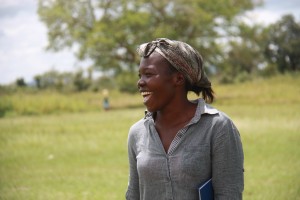African Revival’s Babra: “The SDG is a solution to the problems our rural schools face”
November 11, 2015
Babra Akello, aged 27, is African Revival’s Agricultural Project Officer. Here, Babra gives us an insight into the progress of the School Demonstration Garden project, including the benefits and challenges of the project, and some uplifting success stories that she has witnessed while working closely with the parents and students.
Looking at the situation where our beneficiaries are, I feel the SDG has come as a solution to the problems that our rural schools face. Because looking at the rural schools, parents are so far away from the school, parents are not always willing to contribute to the development of the school, so the school management and the head teachers have to pull ropes with the parents. When it reaches the time of examinations, pupils have not paid, but the school has to buy chalks, reference books etc. But the SDG brings parents closer to the school, opening their eyes to the school and contributes towards the development of the school.
And by them coming to the school, they are not just coming to work on the project, but they are coming to check on the progress and education of their children. And this follow-up for any other parents who are not involved is hard to do. And then it is benefiting them because as they come to work, they are learning different knowledge in agricultural practices, in saving the money, in actually planning for their home, and actually finding appropriate solutions to their household problems.
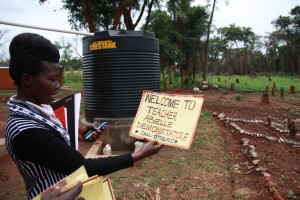 Also in a way, its even helping the communities to wipe away gender based violence. You know, most times, if all the family, the husband and wife are involved in the project, this means that they are going to listen to such messages. Because as we train them, there are crosscutting issues that I as a technical person, I do touch. On top of what the project wants from us, after training in the good agricultural practices, after doing the VSLA, there are issues of gender based violence, of HIV prevalence that we always touch upon. So in a way, the parents are all benefitting, and when they get home, they can’t now fight in their house, they can now sit together and plan for their home, plan for their education of their children.
Also in a way, its even helping the communities to wipe away gender based violence. You know, most times, if all the family, the husband and wife are involved in the project, this means that they are going to listen to such messages. Because as we train them, there are crosscutting issues that I as a technical person, I do touch. On top of what the project wants from us, after training in the good agricultural practices, after doing the VSLA, there are issues of gender based violence, of HIV prevalence that we always touch upon. So in a way, the parents are all benefitting, and when they get home, they can’t now fight in their house, they can now sit together and plan for their home, plan for their education of their children.
The agricultural practices that they learn, when they replicate at their household level, they are going to increase on their production. This means they are going to have surplus food at a household level, where they can have enough to eat, where they can have enough to keep, where they can have enough to sell and cater for other basic needs. They will be in the position to pay school fees, buy scholastic materials.
So far I would say that the project is progressing fast looking at the level we have reached. We have sensitized, we have formed the groups, we have initiated the SDGs, we have already got some harvest from the garden. And also the most interesting thing, you know the people we train, there are people who are fast learners, people who are medium, people who takes time to understand. And the most interesting part is that the fast learners have already even got to the level of replicating what they have learned form the SDG at home. So to me, that is already progress in the project.
As a good trainer, much as there are fast learners, you concentrate most on the medium and slow learners, so they can catch up with the fast learners. So like with the parents group, we cannot now say we are going to push them push them – what you do, each and every time you give assignments, today we’ve learned this, and next week people should begin replicating, and when you are looking out for who has replicated, you start out with the slow learners, asking ‘have you done this’ in a good way because you don’t have also to make them know that they are slow in learning. You just use your facilitating talents to make them also understand and slowly slowly, they will also come to understand.
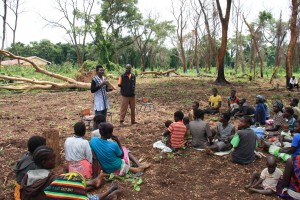 One of the challenges of the SDG is the issue of land dispute. You know, land issues in the Acholi region are not something easy, especially in Langera. During the project launch in the district, one of the committee members of the school just stood up boldly and said ‘I don’t think this project is going to work because in Langera we don’t have so much land’. And that school was already assigned to me, so I felt like ‘how am I going to overcome this?’. But something came into my mind that ‘no you go on, and do what you’re supposed to do, and maybe it can turn out to be a success story’. And when I went for the mobilisation, I found the head teacher who told me, ‘you know what, you don’t have to fear, you just come, the school is there, we are going to work together, and overcome these land issues, and what we are going to do, we are going to sit with these management committees, and make sure we apportion the SDG site to be on the other side where they are wrangling over”. So the parents came, and I used my tricks with the parents to ensure that we succeeded. And the parents were on my side, everything went well, and right now Langera stands to be a success story because there are no more land wrangles, and when the bestseller donor came, the chairperson of the SMC even highlighted that as a success – that the SDG has enabled us to solve the land issues that were in the school. So that wasn’t easy to reach the level we have now.
One of the challenges of the SDG is the issue of land dispute. You know, land issues in the Acholi region are not something easy, especially in Langera. During the project launch in the district, one of the committee members of the school just stood up boldly and said ‘I don’t think this project is going to work because in Langera we don’t have so much land’. And that school was already assigned to me, so I felt like ‘how am I going to overcome this?’. But something came into my mind that ‘no you go on, and do what you’re supposed to do, and maybe it can turn out to be a success story’. And when I went for the mobilisation, I found the head teacher who told me, ‘you know what, you don’t have to fear, you just come, the school is there, we are going to work together, and overcome these land issues, and what we are going to do, we are going to sit with these management committees, and make sure we apportion the SDG site to be on the other side where they are wrangling over”. So the parents came, and I used my tricks with the parents to ensure that we succeeded. And the parents were on my side, everything went well, and right now Langera stands to be a success story because there are no more land wrangles, and when the bestseller donor came, the chairperson of the SMC even highlighted that as a success – that the SDG has enabled us to solve the land issues that were in the school. So that wasn’t easy to reach the level we have now.
Schools are experiencing land disputes, because initially in the rural communities, somebody will just come willingly and give out land for the school. And at times they go into signing maybe an agreement that I am giving this portion of land. But eventually the person dies and either the children or the grandchildren now begin disturbing the school, and also most of the schools do not possess a land title, so such issues makes conflicts to always arise.
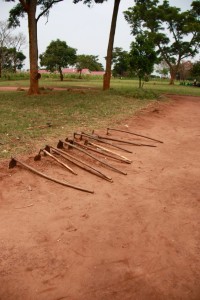 One of my favourite moments of the project was in Layima Primary School. Layima has been a school where the parents are so so much interested in the project; their numbers have been overwhelming. When you take a project in the community, the expectations are always so high, but we have a budget line that we are supposed to operate within, and it can look quite challenging. At Layima, especially the tools for the beneficiaries – at first this looked like it was a challenge because the numbers were up to 80 members, but there were only 47 hoes. My favourite moment came when we had to sit down with the parents and make them understand that this other support, the tools are just brought to ensure that work starts, but they themselves have to own the project, and if they are willing they can even contribute towards the project by coming with their hoes. And it was an amazing moment when the members agreed that ‘lets first put these hoes intact and use our own hoes’. Even up to now, we’ve not distributed the hoes, and the parents are thinking of giving them to the school, so that the entrepreneurship club can be using it. That was my favourite moment because it felt challenging but a solution was derived.
One of my favourite moments of the project was in Layima Primary School. Layima has been a school where the parents are so so much interested in the project; their numbers have been overwhelming. When you take a project in the community, the expectations are always so high, but we have a budget line that we are supposed to operate within, and it can look quite challenging. At Layima, especially the tools for the beneficiaries – at first this looked like it was a challenge because the numbers were up to 80 members, but there were only 47 hoes. My favourite moment came when we had to sit down with the parents and make them understand that this other support, the tools are just brought to ensure that work starts, but they themselves have to own the project, and if they are willing they can even contribute towards the project by coming with their hoes. And it was an amazing moment when the members agreed that ‘lets first put these hoes intact and use our own hoes’. Even up to now, we’ve not distributed the hoes, and the parents are thinking of giving them to the school, so that the entrepreneurship club can be using it. That was my favourite moment because it felt challenging but a solution was derived.
Another amazing moment was in Abera p/s. During the formation, this group had the highest expectations, more than any other group. With the trainings and mentorship, they turned out to be the best group via production and they are a group of 55 members only, but they are quite hardworking. And as I talk now, they are still leading in the production record. For the first season, they have actually got 1.7 million out of their production, and we are expecting more for the second season. So that actually amazed me, because looking at that, it makes me feel like the effort, my travel there, my trainings, has yielded fruits. So it gives me happiness.
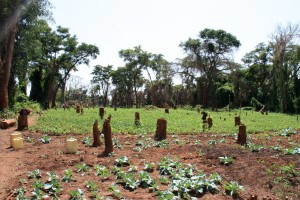 I hope that the project will achieve all its objectives. Looking at the objectives of bringing the parents closer, increasing the retention rates of the pupils in school, ensuring the school feeding program, increasing productivity – with the speed we are going, I hope we will achieve all the objectives.
I hope that the project will achieve all its objectives. Looking at the objectives of bringing the parents closer, increasing the retention rates of the pupils in school, ensuring the school feeding program, increasing productivity – with the speed we are going, I hope we will achieve all the objectives.

